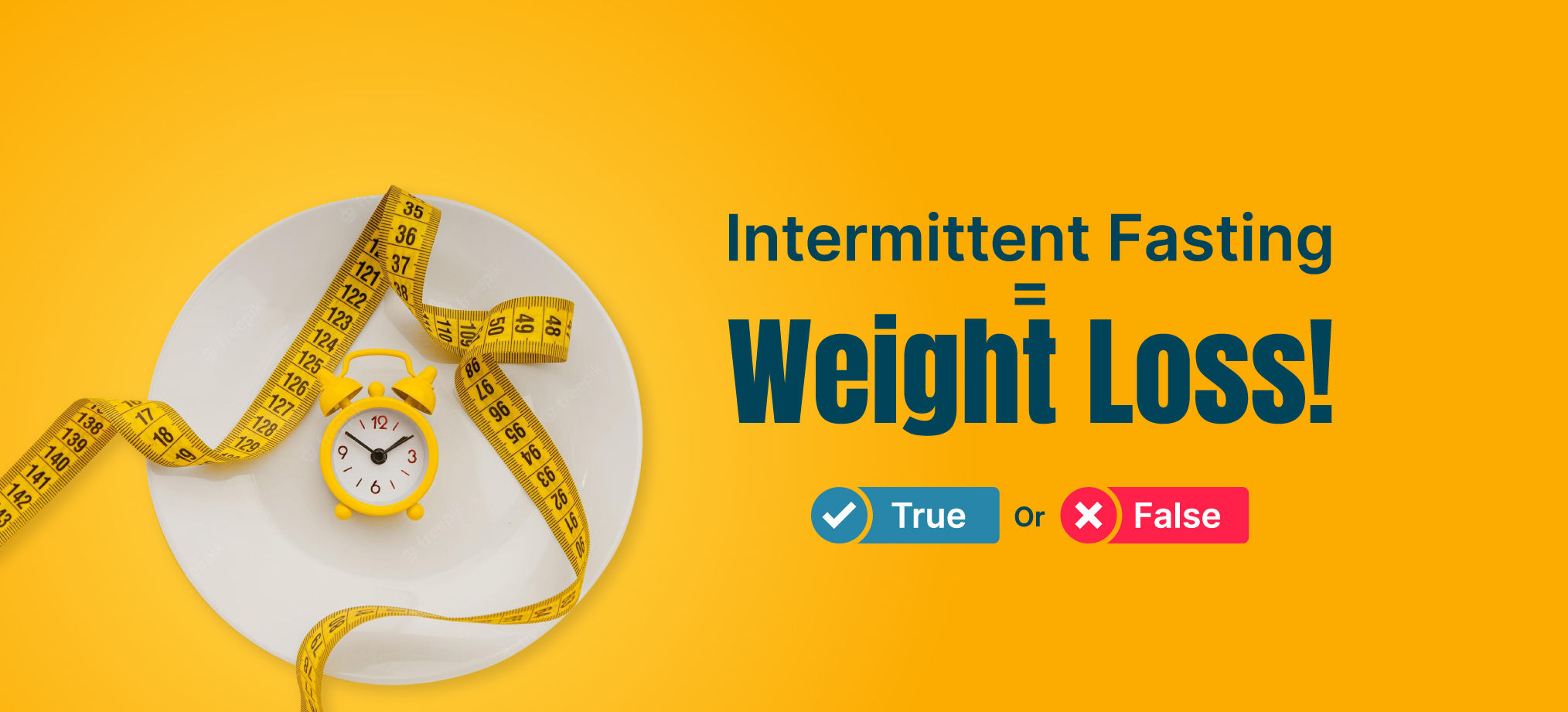Weight Management
Does Intermittent Fasting Help with Weight Loss?
4 min read
By Apollo 24/7, Published on - 21 December 2021, Updated on - 31 July 2023
Share this article
6
87 likes

Research shows that intermittent fasting is more effective than most other diet plans. The premise of intermittent fasting is to lower the levels of insulin in the body, encouraging the consumption of body’s stored fat for energy. Apart from weight loss, intermittent fasting aids in lowering blood sugar, improving metabolism, and reducing inflammation. It also helps get rid of toxins from the body, lowers the risk of cancer, and improves brain function.
What is intermittent fasting?
Intermittent fasting refers to an eating pattern that alternates planned periods of fasting with mealtimes, with no restrictions in terms of food consumed or portion sizes. Studies show that intermittent fasting reduces the intake of total calories by about 10 to 30%, leading to weight loss.
Types of intermittent fasting for weight loss
Research shows that three types of intermittent fasting plans can lead to weight loss.
- Alternate day fasting: Alternating between one day of unrestricted eating and one day of fasting with one meal that offers around 25% of the daily calorie requirement.
- Whole-day fasting: Complete fasting for 1-2 days per week with up to 20% calorie intake, with unrestricted eating on the other 5 days. This is referred to as the 5:2 diet approach with no food restriction for 5 days and a 400-500 calorie diet for 2 days in a week.
- Time-restricted feeding: A meal plan with a specific time for fasting. For instance, meals can be eaten between 8 AM and 3 PM, while fasting for the rest of the day. However, there is no calorie restriction during the eating period.
How does intermittent fasting work to aid weight loss?
When we consume food, it is broken down into sugars by the enzymes in our gut. These sugars enter our bloodstream, and the cells use them for energy with the help of insulin. The unused sugar is then stored as fat.
During fasting, the insulin levels decline, resulting in the release of stored fat for energy. After hours of fasting, when sugar stores get depleted, the body starts burning fat. This process is known as metabolic switching. Intermittent fasting helps lose weight by extending the fasting period long enough for the body to burn all the calories consumed during the last meal so that it starts burning fat.
Is intermittent fasting safe for everyone?
While intermittent fasting is safe for most, it is not recommended for individuals who are:
- Diabetics
- Diagnosed with eating disorders
- Pregnant
- Breastfeeding
- In an active growth stage (children and teens)
- Using medications that require food intake
How to get the best results from intermittent fasting?
During the fasting period, water and zero-calorie beverages (black coffee and tea) can be consumed, and during the eating period, one can have regular meals. However, one should consider avoiding high-calorie junk foods, deep-fried items, and sugary treats. It is best to eat a variety of foods from different food groups.
A few tips include:
- Eliminating sugary foods and refined grains.
- Eating fruits, vegetables, whole grains, beans, lentils, leafy greens, lean proteins, and healthy fats.
- Eating slowly and frequently during the eating period.
- Preparing meals in advance.
- Staying adequately hydrated.
- Letting the body burn fat between meals by avoiding snacks.
- Considering a simple plan of intermittent fasting such as limiting the eating period in a day. However, it is best to make it earlier in the day (Example: 7 AM-3 PM or 10 AM-6 PM).
- Avoiding snacks at nighttime.
While following the aforementioned dietary tips, it is also important to stay active throughout the day to help build muscle tone.
Conclusion
While many diets are based on what to eat, intermittent fasting is all about when to eat. A simple change in timing of the meals can make a big difference. There are several ways in which intermittent fasting can be done. One may try out different plans to narrow down on one that works best suits their lifestyle. However, intermittent fasting may not suit everyone—it is advisable to speak to a dietitian before attempting intermittent fasting.
Weight Management
Leave Comment
Recommended for you

Weight Management
Can This Diabetes Medicine Really Help You Lose Weight?
Injectable incretin mimetic drugs not only help those with type 2 diabetes control their blood sugar levels but also lose weight. Sounds too good to be true, right? Read on to learn about incretin mimetic drugs and how they can help.

Weight Management
Gain Weight Naturally & Quickly With These Foods!
Gaining weight naturally can be difficult, especially for those who have a fast metabolism or low appetite. However, this problem can be solved by consuming certain foods that help in natural and effective weight gain.

Weight Management
4 Principles of Weight Management by Dr. Raj Palaniappan
In the midst of our hectic schedules, maintaining a healthy weight can be a real challenge. Our reliance on fast food, sugary drinks, and short sleep cycles all contribute to our unhealthy weight. Find out what our expert, Dr. Raj Palaniappan has to say in this article.
Subscribe
Sign up for our free Health Library Daily Newsletter
Get doctor-approved health tips, news, and more.
Recommended for you

Weight Management
Can This Diabetes Medicine Really Help You Lose Weight?
Injectable incretin mimetic drugs not only help those with type 2 diabetes control their blood sugar levels but also lose weight. Sounds too good to be true, right? Read on to learn about incretin mimetic drugs and how they can help.

Weight Management
Gain Weight Naturally & Quickly With These Foods!
Gaining weight naturally can be difficult, especially for those who have a fast metabolism or low appetite. However, this problem can be solved by consuming certain foods that help in natural and effective weight gain.

Weight Management
4 Principles of Weight Management by Dr. Raj Palaniappan
In the midst of our hectic schedules, maintaining a healthy weight can be a real challenge. Our reliance on fast food, sugary drinks, and short sleep cycles all contribute to our unhealthy weight. Find out what our expert, Dr. Raj Palaniappan has to say in this article.